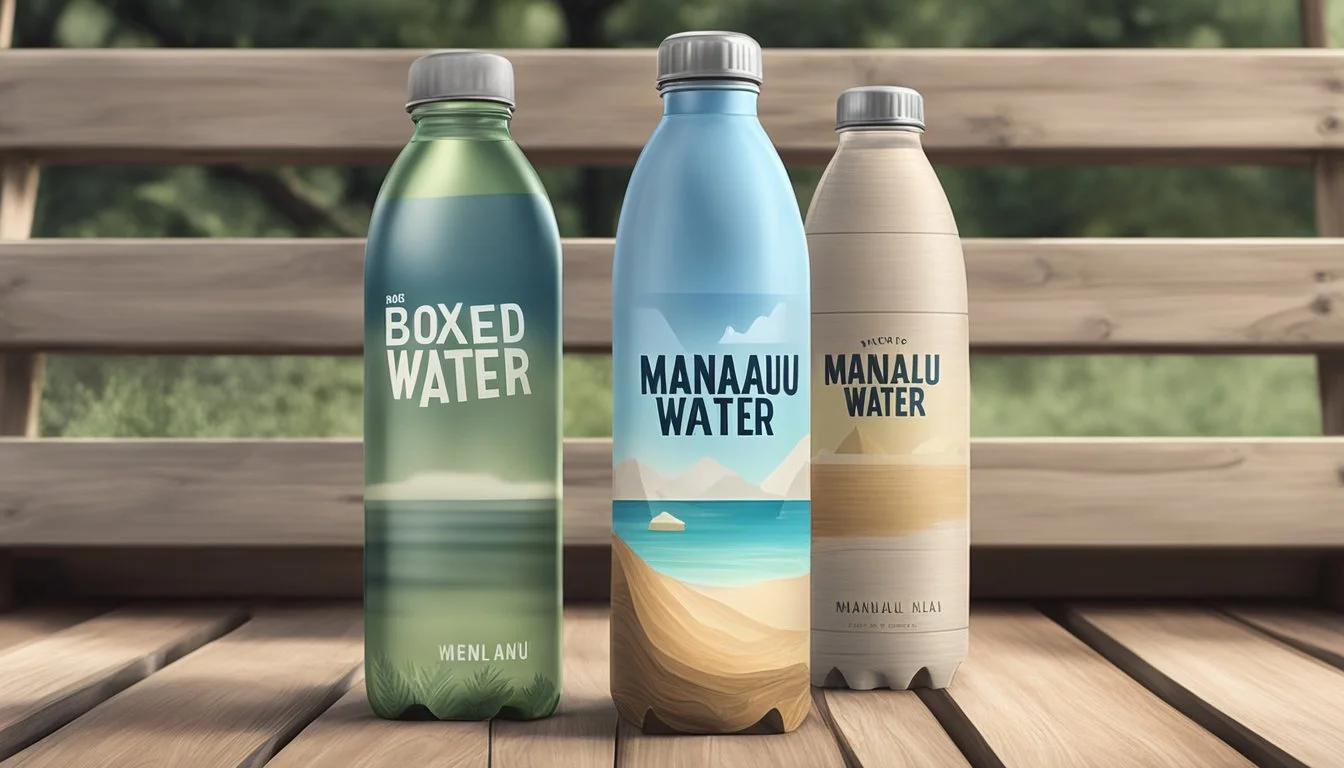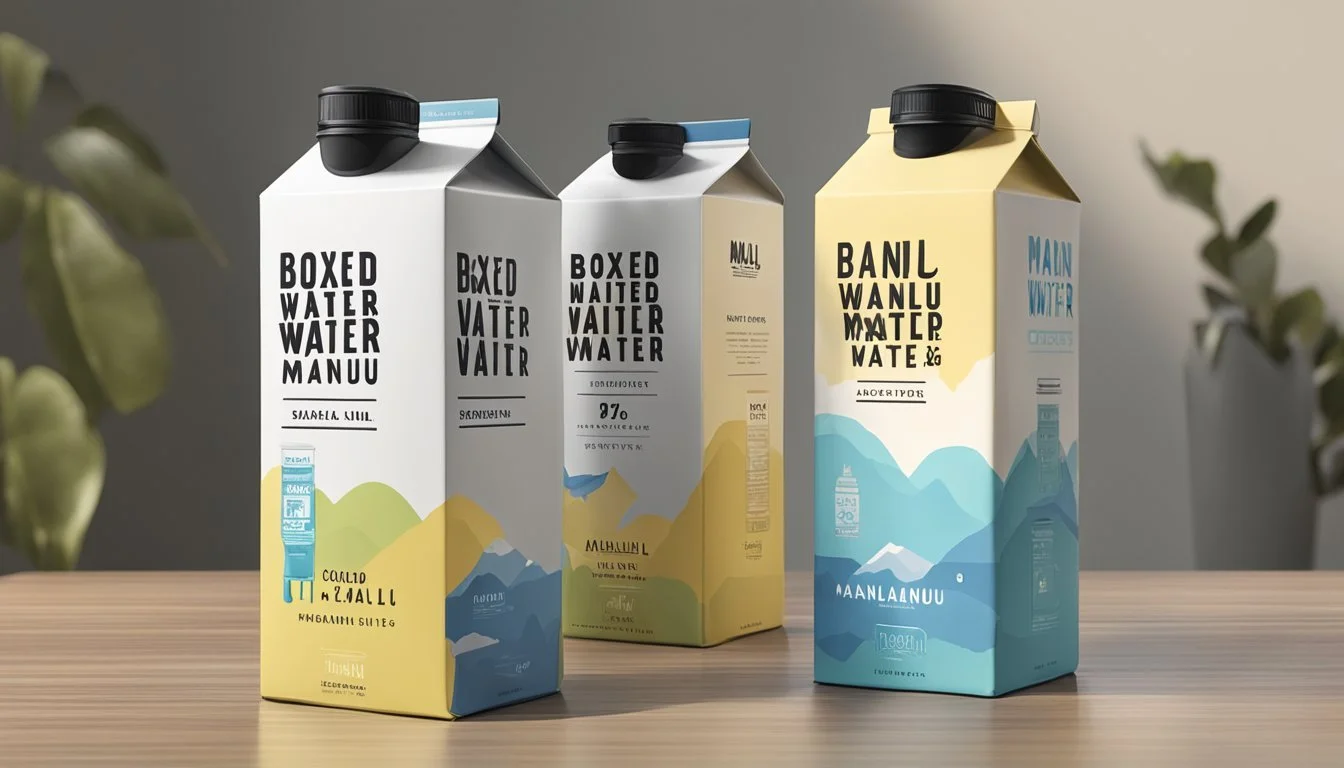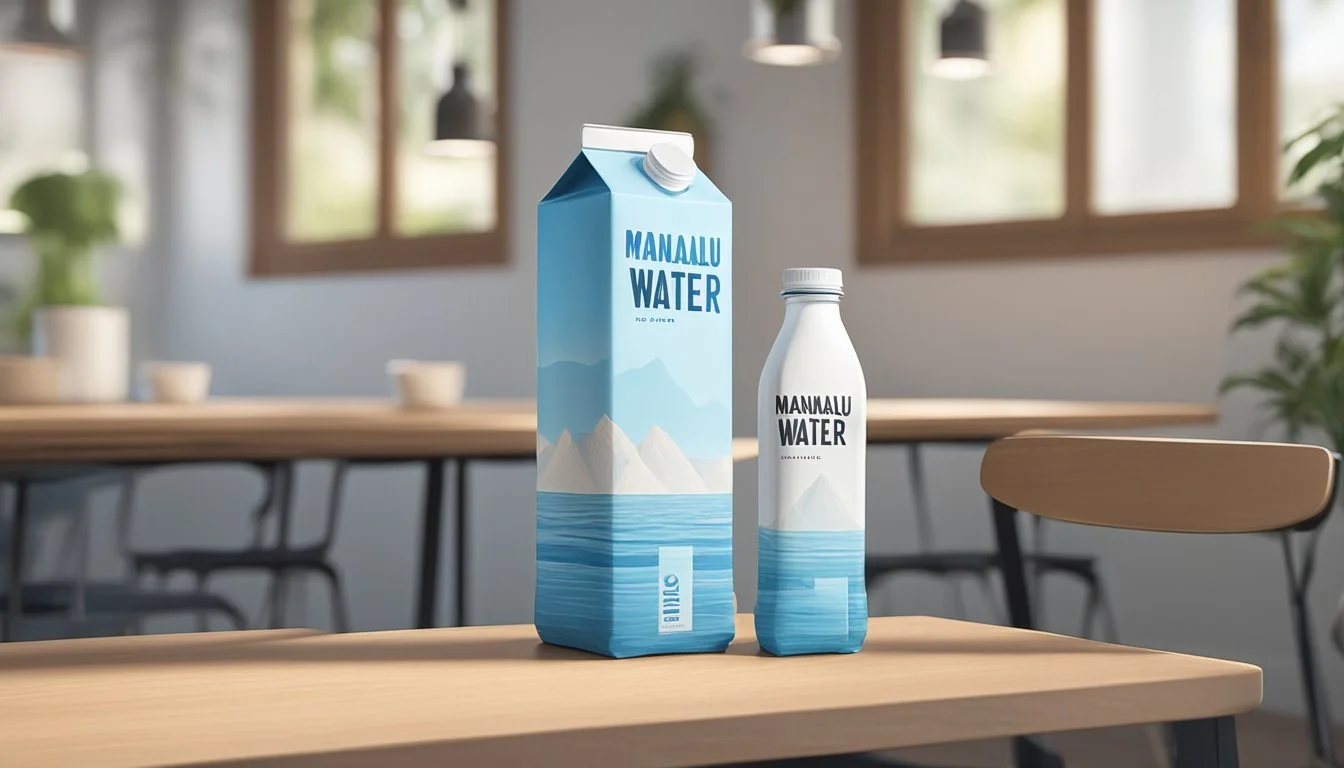Boxed Water vs. Mananalu
A Comparative Analysis of Bottled Water Brands
When it comes to choosing between Boxed Water and Mananalu, the decision largely hinges on sustainability and environmental impact. Boxed Water, founded in 2009, prides itself on offering water packaged in 92% plant-based cartons. These cartons are primarily made from sustainable paper, combined with a small percentage of aluminum and plastic to ensure waterproofing and durability.
Mananalu, launched by Jason Momoa, offers an alternative with water packaged in 100% recyclable aluminum cans. This initiative aims to reduce the use of single-use plastic bottles by providing a more environmentally friendly option. While both Boxed Water and Mananalu present strong cases for sustainability, the materials they use and their renewable content set them apart.
Consumers looking for the most eco-friendly option will find both brands promising. Overall, Boxed Water's significant use of renewable plant-based materials may give it an edge in terms of sustainability over Mananalu’s focus on recyclable aluminum. Each product's design reflects a thoughtful approach to reducing environmental harm, encouraging consumers to make more conscientious choices in their bottled water consumption.
Overview of Boxed Water and Mananalu
Both Boxed Water and Mananalu are making strides in providing more sustainable bottled water options to consumers, utilizing different materials and missions. They aim to reduce environmental impact while offering high-quality purified water.
Boxed Water Is Better
Boxed Water Is Better produces its water in cartons that are made primarily from plant-based materials. The design is similar to milk cartons, which are 92% renewable. This brand prides itself on the quality of its water, which undergoes a multi-step purification process.
Their water has been noted for its crispness and neutral taste, making it a refreshing choice. Additionally, Boxed Water is committed to sustainability beyond packaging. They support reforestation and water resource conservation efforts. This makes it a favored option for eco-conscious consumers who are looking to reduce their plastic footprint.
Mananalu Water
Mananalu Water, founded by Jason Momoa, utilizes 100% recyclable aluminum bottles to provide an alternative to single-use plastic bottles. Inspired by the actor's role in "Aquaman" and his dedication to environmental causes, Mananalu emphasizes reducing plastic waste.
The water is purified and promises a refreshing and hydrating experience. Aluminum bottles offer durability and the possibility of reuse, aligning with the brand’s mission. Mananalu has also partnered with companies like Alaskan Airlines and Hawaiian Airlines to increase visibility and accessibility.
The brand's Hawaiian connection and Momoa's influence help drive its eco-friendly message, promoting an impactful choice for environmentally aware consumers.
Packaging Materials and Environmental Sustainability
The choice of packaging materials significantly impacts the environmental sustainability of bottled water products. This section compares the materials used, the recycling processes involved, and the environmental footprints of Boxed Water and Mananalu.
Material Comparison
Boxed Water and Mananalu use different materials for their packaging.
Boxed Water packaging is primarily made of paper, sourced from FSC-certified, well-managed forests. It includes a small percentage of plant-based plastic and aluminum to ensure durability and water resistance. **Boxed Water claims their packaging is 92% renewable, largely due to its high plant-based content.
In contrast, Mananalu embraces 100% recyclable aluminum bottles. Aluminum is highly durable and can be infinitely recycled without significant loss of quality. This contrasts starkly with traditional single-use plastic bottles, which are less environmentally friendly.
Recycling Processes
Recycling methods for Boxed Water and Mananalu differ due to their packaging materials.
Boxed Water cartons, composed of paper, aluminum, and plastic layers, require specialized facilities for proper recycling. The multi-material composition can complicate the recycling process. Despite this, the renewable paper component ensures a smaller environmental burden compared to pure plastic bottles.
Mananalu's aluminum bottles boast easier recyclability. Aluminum can be recycled repeatedly with minimal degradation, making it an efficient material from a recycling perspective. This simplicity provides a better end-of-life process, reducing the environmental impact compared to more complex packaging types.
Environmental Footprint of Packaging
The overall environmental impact of packaging materials extends beyond recyclability.
Boxed Water's packaging uses a mix of renewable paper, plant-based plastic, and a small amount of aluminum. The high percentage of renewable content contributes to a lower carbon footprint during production. Sourcing paper from sustainable forests further mitigates environmental damage.
Mananalu's aluminum bottles, though energy-intensive to produce, offer durability and superior recyclability. Aluminum production has a higher initial carbon footprint, but the ability to recycle aluminum endlessly without substantial quality loss offsets this initial impact over time. Moreover, using recycled aluminum significantly reduces energy consumption and emissions compared to new aluminum production.
Boxed Water and Mananalu present distinct approaches to packaging sustainability, reflecting their materials' unique benefits and challenges.
Product Features and Consumer Experience
Comparing Boxed Water and Mananalu involves examining key factors such as taste, purity, convenience, and safety considerations. Each brand offers unique features designed to appeal to environmentally conscious consumers.
Taste and Purity
Boxed Water markets its product as pure, using a filtration process to ensure high water quality. The water is appreciated for its clean taste with no added minerals, maintaining a neutral pH. The use of sustainable paper cartons does not affect its taste.
Mananalu provides purified water packaged in aluminum cans. Unlike Boxed Water, Mananalu also offers naturally alkaline water options. The aluminum packaging preserves the water's natural taste, ensuring that there are no plastic-like aftertastes common in traditional plastic bottles.
Convenience and Portability
Boxed Water is available in various sizes, making it easy for consumers to choose based on their needs. Its cartons are lightweight and designed to be recyclable and refillable. This makes it a convenient choice for consumers looking to reduce plastic waste while maintaining portability.
Mananalu offers an edge with its durable aluminum cans, which are highly portable and designed for reuse. The cans are more resistant to damage compared to cartons, providing a sturdier option for those on the go. Mananalu's convenient packaging appeals to consumers seeking a robust and eco-friendly alternative.
Safety and Health Considerations
Boxed Water emphasizes its commitment to health and safety by using renewable materials and ensuring its cartons are free from harmful chemicals. The mix of sustainable paper, aluminum, and plastic ensures that the product remains sealed and safe for consumption.
Mananalu similarly focuses on consumer safety, offering purified water in aluminum cans that eliminate the risk of microplastics found in traditional plastic bottles. The naturally alkaline options provided by Mananalu might appeal to health-conscious individuals looking for added benefits.
Both brands address safety concerns with their packaging, aiming to provide consumers with healthier alternatives to standard plastic water bottles.
Economic and Personal Impact
Exploring the economic and personal impact of Boxed Water and Mananalu reveals important differences in cost, consumer accessibility, and the role of personal choices in sustainability.
Cost-Effectiveness
Boxed Water and Mananalu differ in their cost structures. Boxed Water is generally lower in price compared to Mananalu, making it a more economical choice for many consumers. For instance, Mananalu’s special six-pack edition priced at $29.99, is notably higher. This substantial price difference reflects not just the cost of packaging but also the marketing and environmental initiatives behind Mananalu.
Consumers looking to reduce their spending on bottled water might find Boxed Water a more budget-friendly option. However, the perceived value of contributing to environmental sustainability by opting for pricier Mananalu bottles could justify the expense for some.
Consumer Accessibility
When it comes to availability, both brands offer different advantages. Mananalu, with its limited-edition products and retail partnerships with stores like HyVee and Foodland, provides unique buying options, though it may not be as readily available as Boxed Water. Boxed Water, on the other hand, is often found in various types of retailers, from convenience stores to larger supermarket chains.
Accessibility impacts consumer choice significantly. If a product is easier to find and purchase, it naturally becomes a more feasible option for daily consumption. Both brands make efforts to reach consumers through online platforms, however, widespread physical availability grants Boxed Water a slight edge in this comparison.
Personal Choices in Sustainability
Personal choices in sustainability encompass more than just purchasing bottled water. Consumers are increasingly aware of terms like greenwashing, where brands might exaggerate their environmental credentials. Both Boxed Water and Mananalu have clear sustainability missions targeted at reducing single-use plastics.
Boxed Water’s recyclable cartons and Mananalu’s aluminum bottles offer different sustainable options. While both encourage reducing plastic waste, incorporating reusable water bottles or tap water use in daily routines can further amplify personal sustainability efforts.
Each brand appeals to those looking to make a sustainable impact. The key lies in consumers balancing cost, accessibility, and their own lifestyle choices to contribute meaningfully to environmental conservation.
Brand Initiatives and Partnerships
Both Boxed Water and Mananalu are actively engaged in efforts to reduce plastic waste and promote environmental sustainability. While they share similar goals, their initiatives and partnerships reflect different approaches and impacts.
Environmental Advocacy
Boxed Water focuses on reducing plastic pollution through its use of cartons made from 74% paper, which are more sustainable than traditional plastic bottles. It also incorporates a small percentage of aluminum and plastic film to ensure the cartons are waterproof and fully sealed. The company partners with environmental organizations like the Ocean Blue Project to further its mission of sustainability.
Mananalu, founded by actor and ocean activist Jason Momoa, uses aluminum bottles to eliminate single-use plastics. Their "Drink One, Remove One" initiative, in collaboration with rePurpose Global, removes the equivalent of one plastic bottle from ocean-bound waste for every bottle sold. As a result, Mananalu has already removed the equivalent of 15 million plastic bottles from the ocean.
Corporate Partnerships and Endorsements
Boxed Water has secured partnerships with major airlines such as Alaska Airlines. This collaboration helps eliminate approximately 1.8 million pounds of single-use plastics per year. They also work with retail giants and corporate entities to expand their reach and impact on reducing plastic pollution.
Mananalu has formed significant corporate partnerships, including a recent collaboration with Hawaiian Airlines. These partnerships not only enhance their environmental efforts but also raise brand awareness. Furthermore, endorsements from high-profile figures, including Jason Momoa, give Mananalu a distinctive edge and credibility in the fight against plastic pollution.
Through these collaborations and initiatives, both brands demonstrate a strong commitment to environmental stewardship and corporate responsibility.
Future of Water Consumption
The future of water consumption emphasizes sustainable solutions and reducing environmental impacts. Innovations in bottled water alternatives and their implications for environmental conservation are focal areas of this transformation.
Innovation in Bottled Water Alternatives
Innovations are driving the transition from traditional bottled water to more sustainable options. Companies like Boxed Water™ and Mananalu illustrate this shift.
Boxed Water™ uses paper-based packaging combined with small amounts of aluminum and plastic to ensure durability and waterproofing. This packaging is more sustainable compared to conventional plastic bottles.
Mananalu aims to eliminate single-use plastic by offering water in 100% recyclable aluminum cans. Their "Drink One, Remove One" initiative further underscores their commitment to environmental responsibility. These innovations signify a meaningful departure from plastic towards more eco-friendly packaging.
Implications for Environmental Conservation
The movement towards sustainable bottled water alternatives has significant environmental implications. The adoption of recyclable materials like aluminum and paper-based cartons helps reduce the environmental footprint.
Eliminating single-use plastic water bottles diminishes marine pollution and decreases CO2 emissions linked to plastic production. Reusable bottles, such as stainless steel options, offer another sustainable choice for consumers, emphasizing longevity and reduced waste.
Moreover, focusing on materials that are plant-based and easily recyclable can further drive down the environmental impact. These initiatives collectively support broader conservation efforts, making clean water access more sustainable and environmentally responsible.






